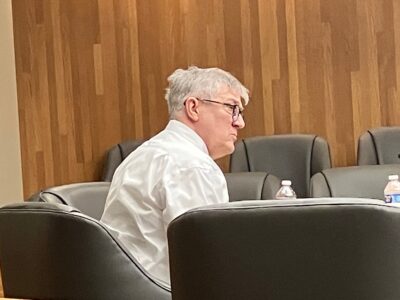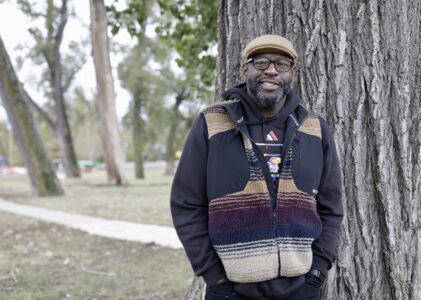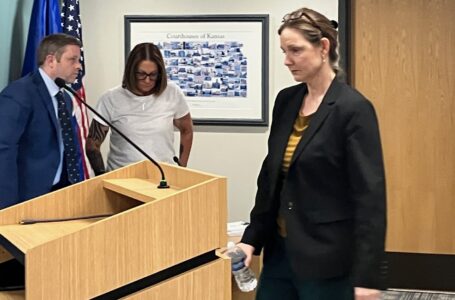Judge denies school district’s request to halt civil cases until speech pathologist’s sex-abuse case is over

photo by: Kim Callahan/Journal-World
Mark Gridley appears Friday, Oct. 3, 2025, at his preliminary hearing in Douglas County District Court.
A Douglas County judge presiding over two lawsuits against the Lawrence school district related to allegations of sexual abuse at an elementary school denied the district’s request to halt the civil proceedings until the criminal case is entirely completed.
Judge Catherine Theisen is overseeing two civil suits brought by separate child plaintiffs against the district, one filed on March 6 and one filed on March 26 — the month after speech pathologist Mark Gridley was arrested on allegations of child sexual abuse at Prairie Park Elementary. Gridley is facing 14 felony counts in criminal court. He is not a party in the civil cases.
In the case filed on March 6 by attorney Reed Martens, Theisen rejected on Tuesday the school district’s assertion that the criminal case should play out in full before discovery can proceed in the civil case.
Martens argued that it was not unusual for civil and criminal cases to run parallel, especially cases where the criminal defendant is not a party in the civil case. This case, he said, was more about what the school district knew and its conduct versus Gridley’s actions per se. He said the evidence was in danger of growing “stale,” prejudicing the plaintiff, if discovery were to be delayed indefinitely. Discovery, he argued, could be “sequenced” to minimize concerns of the defendant.
He also noted that this lawsuit, unlike the other civil lawsuit, had dropped its claim that the school district was vicariously liable for Gridley’s criminal conduct, removing the complicating issue of whether the alleged abuse legally occurred within the scope of Gridley’s employment. Such an issue would more obviously “overlap” with issues in the criminal case than would the two remaining claims in the civil suit: that the school district was negligent in hiring and retaining Gridley and that the district was negligent in supervising him.
Theisen noted that issuing a stay would be an “extraordinary remedy” under state law and that the party seeking it had the burden of proving its necessity — a burden that she said the attorney for the school district, Greg Goheen, had not met. Theisen cited such factors as an interest in the efficient resolution of cases and the availability of evidence. She noted that criminal cases could go on for years, and freezing discovery in a related civil case was “too broad a remedy.”
In the case filed on March 26 by attorney Tess Ramirez, Theisen did issue a six-month stay on discovery, which Goheen and Ramirez both said they were amenable to. Theisen noted that the position of the plaintiff in this case was different than in the other civil suit because the vicarious liability claim was still in play.
She scheduled case management conferences in both cases to keep them on track.
The school district also asked Theisen to take judicial notice of the arrest affidavit in the criminal case as part of the district’s effort to dismiss the remaining vicarious liability claim. Goheen said the affidavit showed that what Gridley allegedly did was clearly not within the scope of his employment. Ramirez said the affidavit was heavily redacted, to the extent that one couldn’t even tell which children were being talked about.
Theisen agreed with Ramirez that an arrest affidavit, in which facts are alleged but not proven and which contain hearsay, is not a proper subject for judicial notice. Judicial notice refers to a court’s power to accept something as true without requiring evidence because the facts in question are generally known or easily verifiable. Theisen then rejected the district’s motion to dismiss the vicarious liability claim, saying facts remained in question.
Movement in Gridley’s criminal case is also expected in coming weeks. On Dec. 18, Judge Amy Hanley is expected to rule on whether the seven kidnapping charges against Gridley will move forward or whether they so closely overlap with the seven aggravated indecent liberties charges that they must be dismissed. On Monday, the state amended its complaint against Gridley so that it now lists an alternative battery charge alongside each aggravated indecent liberties charge.





